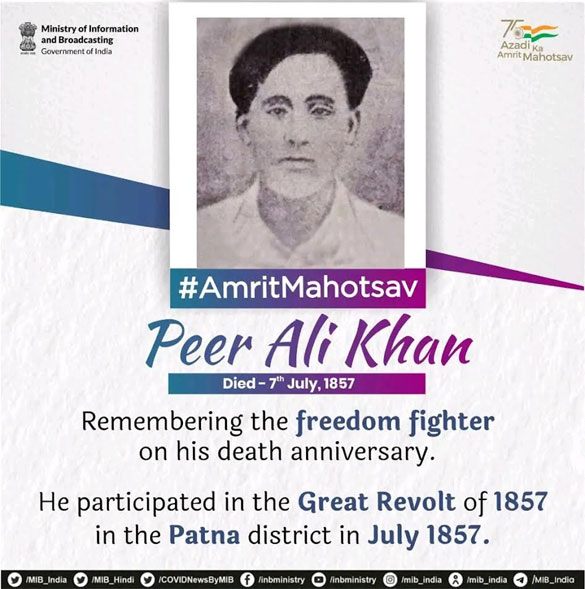Peer Ali Khan: The Quiet Revolutionary of the Great Revolt of 1857

By Syed Amjad Hussain,
New Age Islam
5 August
2024
In The Annals of Indian History, The Great
Revolt Of 1857 Stands Out As A Significant Chapter Of Resistance Against
British Colonial Rule. Among The Numerous Unsung Heroes Of This Pivotal
Uprising, Peer Ali Khan Emerges As A Particularly Intriguing Figure.
-----
Main Points:
1.
Peer Ali Khan, born around 1812, was
a secretive revolutionary who used his bookselling profession to support the
Great Revolt of 1857.
2.
His shop served as a covert hub for
distributing revolutionary materials in Patna.
3.
Khan was arrested and publicly
executed by the British on July 7, 1857.
4.
His legacy is honoured by a road and
park named after him in Patna, Bihar.
-----

In the
annals of Indian history, the Great Revolt of 1857 stands out as a significant
chapter of resistance against British colonial rule. Among the numerous unsung
heroes of this pivotal uprising, Peer Ali Khan emerges as a particularly
intriguing figure. His story, though often overshadowed by more prominent
leaders, reveals much about the clandestine nature of revolutionary activities
during this tumultuous period.
Early Life and Background
Peer Ali
Khan, born around 1812, is a figure enveloped in mystery. The exact details of
his birthplace remain unclear, a reflection of the secretive life he led.
According to William Taylor, an official of the East India Company and
Commissioner of Patna Division from 1855 to 1857, Khan was believed to have
originated from Lucknow. Taylor's observations suggest that Khan had settled in
Patna, where he established himself as a bookseller. Taylor speculated that
Khan's choice of profession was likely a deliberate strategy to mask his
revolutionary activities.
Role in the Great Revolt of 1857
As a
bookseller, Peer Ali Khan leveraged his position to orchestrate and support
revolutionary activities. His shop was not just a place of business but a
covert hub for distributing important leaflets, pamphlets, and coded messages
vital to the freedom struggle. Through this seemingly innocuous facade, Khan
played a critical role in the organization of the Great Revolt of 1857 in
Patna.
The revolt,
which began as a mutiny among British soldiers, quickly evolved into a broader
rebellion against colonial rule. Khan's involvement in the Patna district was
instrumental in mobilizing support and coordinating resistance efforts. His
work was part of a larger, intricate network of resistance that spanned the
length and breadth of India.
Capture and Execution
The British
response to the rebellion was swift and brutal. On July 4, 1857, Peer Ali Khan
was arrested along with 33 of his followers. The crackdown was severe, and
Khan, alongside his comrades, was subjected to a public trial. On July 7, 1857,
Peer Ali Khan was hanged in full public view by William Taylor, who was
determined to make an example of the rebels. This act of execution was part of
a broader campaign by the British to suppress the uprising and intimidate
potential supporters.
The public
execution of Peer Ali Khan and 14 other rebels, including notable figures such
as Ghasita Khalifa and Ghulam Abbas, was a grim demonstration of British
resolve to quell dissent. The execution of these individuals not only marked
the end of their participation in the revolt but also served as a stark warning
to others who might consider challenging British authority.
Legacy and Commemoration
Despite his
relatively obscure background and the brutal end to his life, Peer Ali Khan's
legacy has been preserved and honoured in modern times. In 2008, the Bihar
government under Nitish Kumar named a road adjacent to the Patna Airport after
him, recognizing his contributions to the struggle for independence.
Additionally, Shaheed Peer Ali Khan Park, located in front of the District
Magistrate's residence near Gandhi Maidan in Patna, was established as a
tribute to his sacrifice.
These
commemorations serve as a reminder of the sacrifices made by countless
individuals like Peer Ali Khan, whose stories might not always be prominent in
historical records but who nonetheless played crucial roles in the fight for
India's freedom.
Conclusion
Peer Ali
Khan's life and sacrifice offer a glimpse into the covert yet critical
operations of the 1857 rebellion. As a bookseller who used his trade to further
the cause of independence, Khan's story is a testament to the varied and
multifaceted nature of the freedom struggle. His legacy, honoured by
contemporary memorials, continues to inspire and remind us of the diverse
contributions to India's fight for freedom.
------
Syed Amjad Hussain is a Bihar-based Author and research scholar of
Sufism. He is affiliated with the Shyama Prasad Institute of Technology and
Management, Kolkata.
URL: https://www.newageislam.com/islamic-personalities/peer-ali-khan-revolutionary-revolt-1857/d/132860
New Age Islam, Islam Online, Islamic Website, African Muslim News, Arab World News, South Asia News, Indian Muslim News, World Muslim News, Women in Islam, Islamic Feminism, Arab Women, Women In Arab, Islamophobia in America, Muslim Women in West, Islam Women and Feminism
